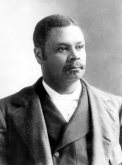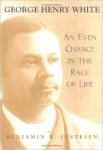Some time back MidLaw pointed out the centrality of the voting rights laws to the careers of legendary Tarboro lawyer George Henry White and legendary Greensboro lawyer, Henry Frye.

Last week, the New York Times Magazine published a major article last week, “A Dream Undone, Inside the 50-year campaign to roll back the Voting Rights Act” in which it reported that the story goes on.
The Times put Brooks Pierce’s Henry Frye right at the center of its report for his role in rolling back the Jim Crow system fifty years ago. But two years ago, North Carolina rewrote its voting laws again and now the North Carolina voter ID law is referred to as one of the “most restrictive voting rights laws since the Jim Crow era.”

And, it falls to MidLaw to recall that Tarboro lawyer George Henry White was at the center of the story when Jim Crow laws began in 1900. When North Carolina enacted its Literacy Test effectively eliminating African Americans from the voting rolls, George White decided not to run for re-election to Congress. That marked the beginning of the Jim Crow era. White’s decision was reported in a Times article at the time, and the Times printed his famous farewell speech in Congress on page one.
White’s biographer says that the closing lines of White’s speech “were among the most widely remembered and widely quoted lines from any speech by a black American for the next half century.”
This, Mr. Chairman, is perhaps the negroes’ temporary farewell to the American Congress; but let me say, Phoenix-like he will rise up some day and come again. These parting words are in behalf of an outraged, heart-broken, bruised, and bleeding, but God-fearing people, industrious, loyal people – rising people, full of potential force.

Raleigh’s News & Observer also marked White’s departure from Congress and hailed the new era, quoting a North Carolina legislator to a much different effect:
Geo. H. White, the insolent negro, who has so long represented the proud people of North Carolina in the Congress of the United States, has retired from office forever. We have a white man’s government in every part of the old State, and from this hour no negro will again disgrace the old State in the council chambers of the nation. For these mercies, thank God.
Benjamin R. Justesen, George Henry White, An Even Chance in the Race of Life (LSU Press 2001).
Tarboro’s George White was central to the story in 1900. Fifty years later, Henry Frye was central to dismantling them. Now, after another fifty years, the fight goes on.
The Times wrapped up its article last week by quoting Frye on where we are today:
It’s not quite what it was a long time ago. It’s more sophisticated now.



 />i
/>i

